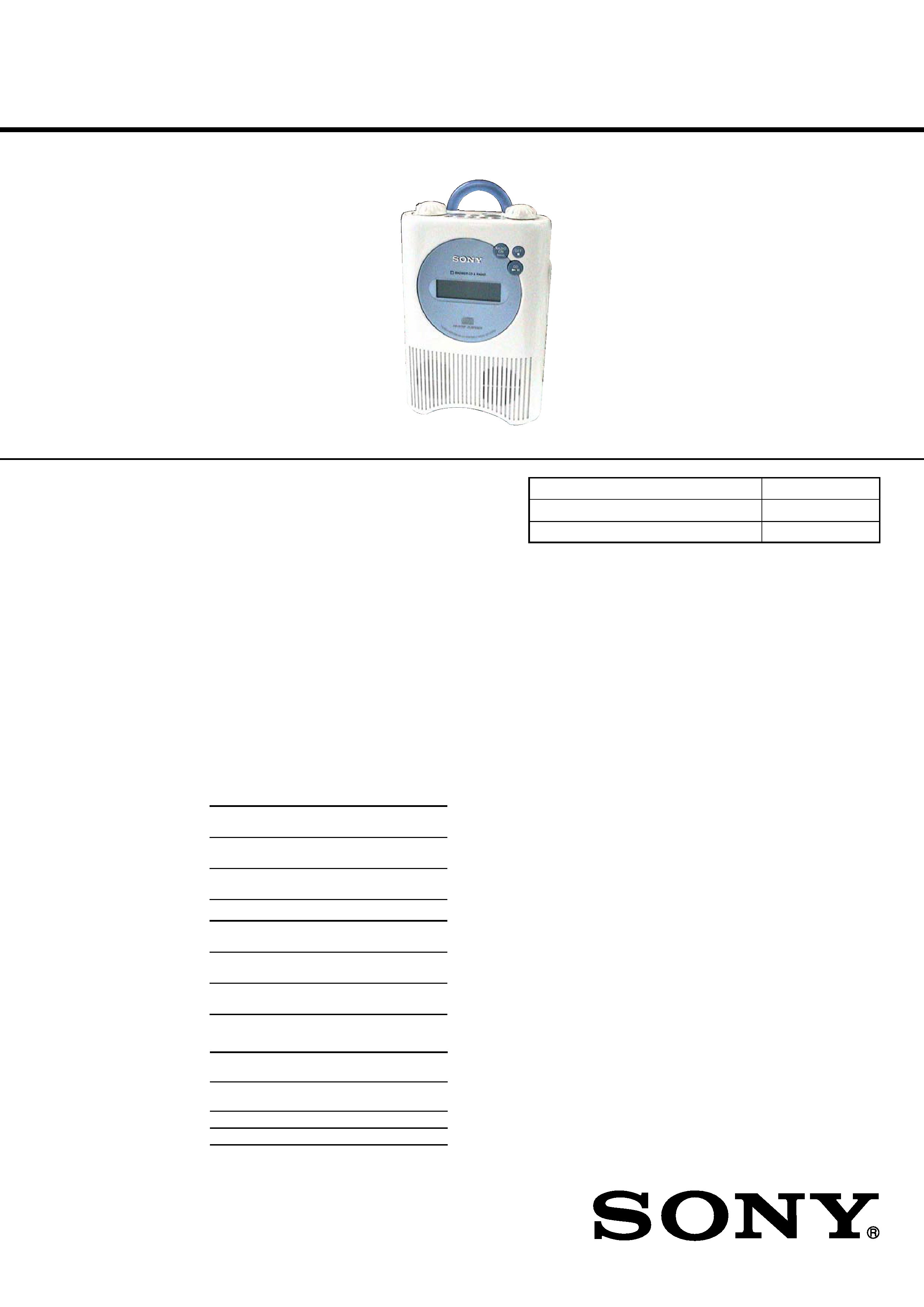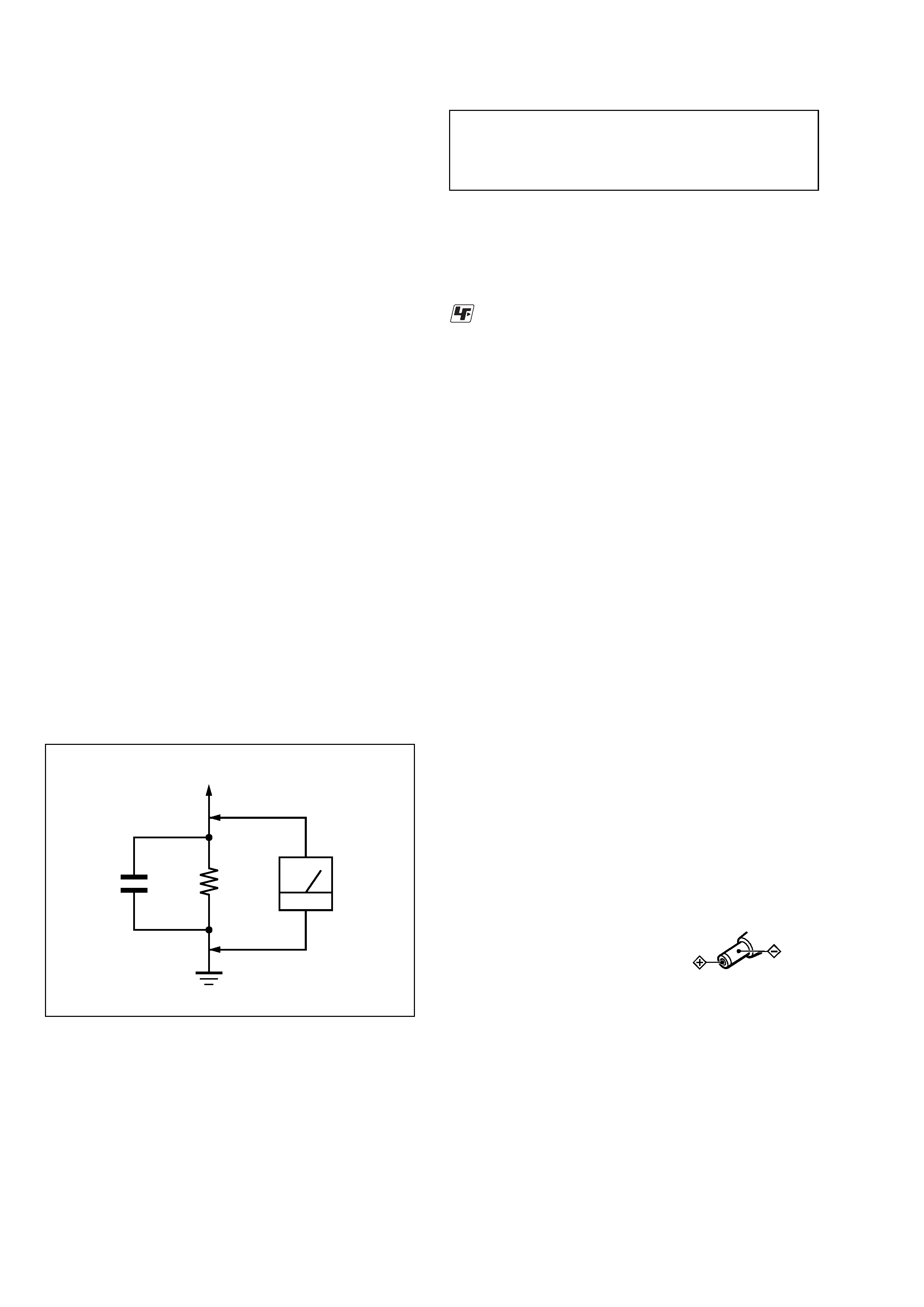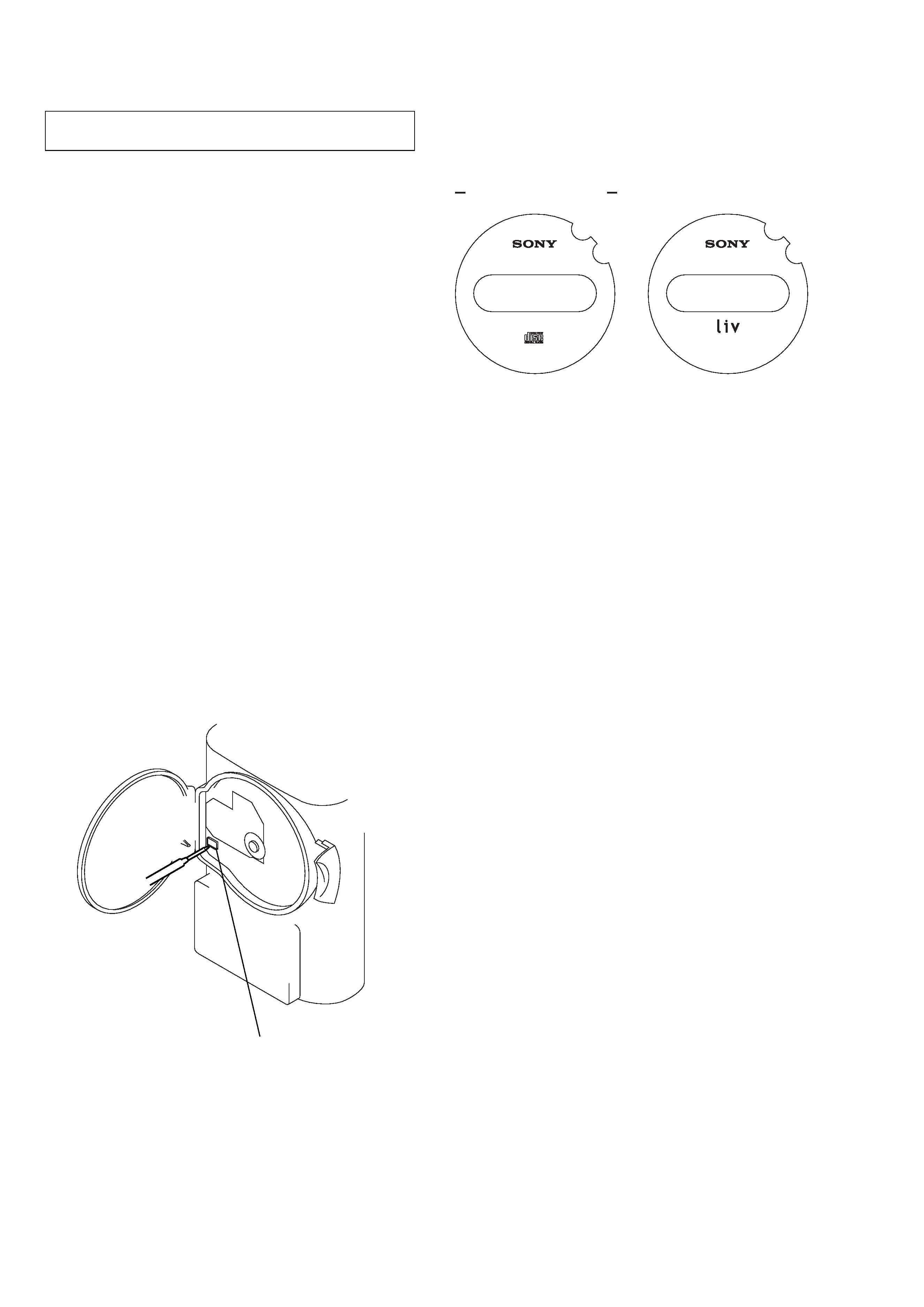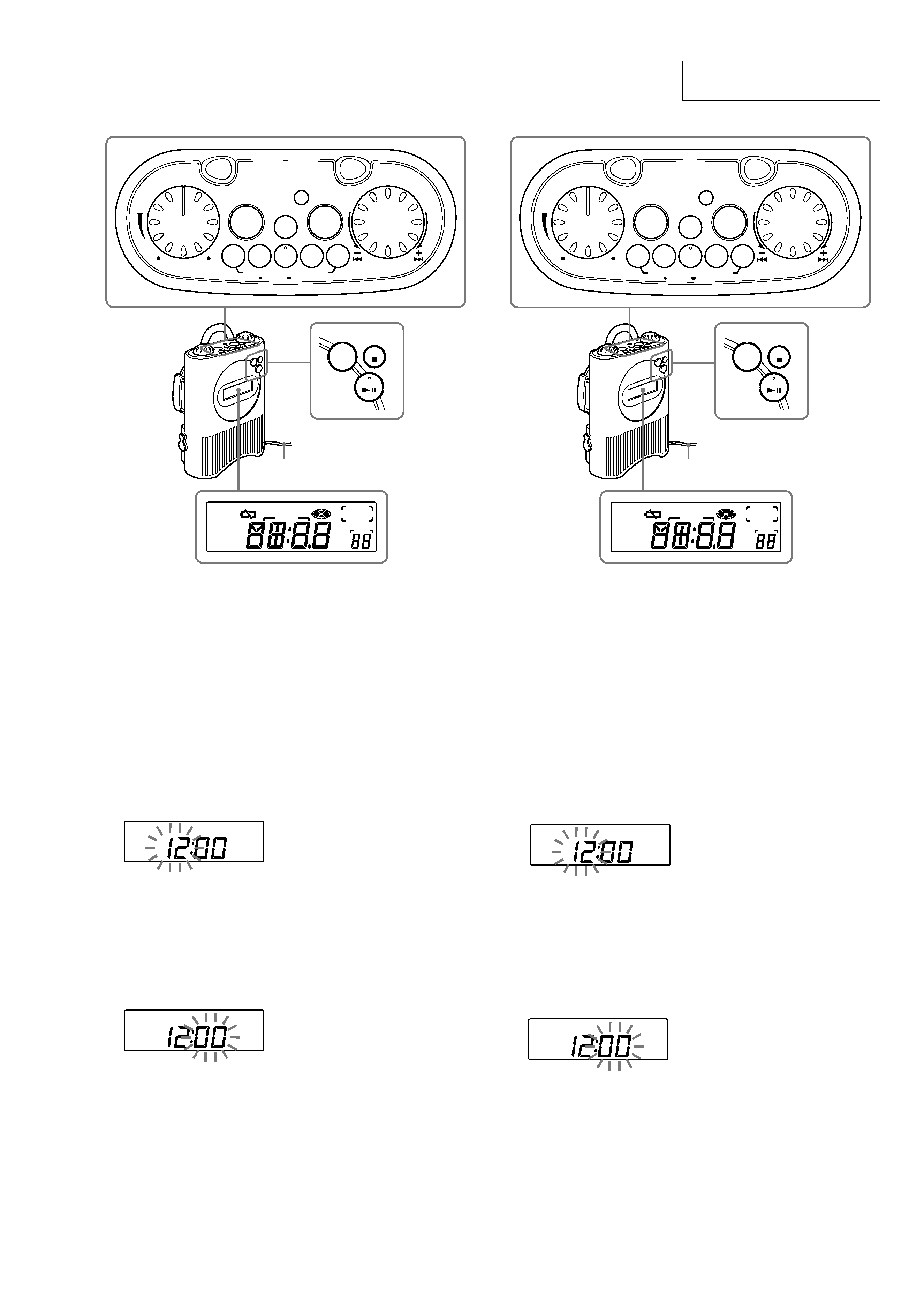
SERVICE MANUAL
ICF-CD73
FM/AM CD PORTABLE RADIO
ICF-CD73V
TV/WEATHER/FM/AM
CD PORTABLE RADIO
US Model
ICF-CD73V
Canadian Model
AEP Model
UK Model
E Model
ICF-CD73
SPECIFICATIONS
ICF-CD73/CD73V
Ver. 1.1 2005.02
9-877-131-02
Sony Corporation
2005B05-1
Personal Audio Group
©
2005.02
Published by Sony Engineering Corporation
Model Name Using Similar Mechanism
ZS-X3CP
CD Mechanism Type
KSM-900AAA
Optical Pick-up Name
KSS-900A
CD player section
System: Compact disc digitalaudio system
Laser diode properties: Material: GaAlAs
Wavelength: 780 nm
Emission duration: Continuous
Laser output:Less than 44.6 W
(This outputis the value measured at a
distance of about 200 mm from the objective
lens surface on the optical pick-upblock with
7 mm aperture.)
Frequency response : 20 --20 000 Hz
+1
--
1.5
dB
Wow and flutter: Below measurable limit
Radio section
Frequency range: (ICF-CD73)
NorthAmerica
Band
Channel
step
FM
87.5 --108 MHz
0.1 MHz
AM
530 --1 710 kHz
10 kHz
FM
87.5 --108 MHz
0.05 MHz
AM
531 --1 710 kHz
9 kHz
Other countries/regions
Band
Channel
step
FM
87.5 --108 MHz
0.05 MHz
AM
531 --1 611 kHz
9 kHz
FM
87.5 --108 MHz
0.1 MHz
AM
530 --1 610 kHz
10 kHz
Frequency range: (ICF-CD73V)
Band
Range
Channel
step
TV
2 --13 ch
1 channel
WEATHER
1 --7 ch
1 channel
FM
87.5 --108 MHz
0.1 MHz
AM
530 --1 710 kHz
10 kHz
General
Time display:
NorthAmerica, UK: 12-hour system
Other countries/regions:24-hour system
Speaker: 50 mm (2 inches) dia, 6
Power outputs:
400 mW + 400 mW (at 10% harmonic
distortion)
Power requirements:
6 V DC, 4 R14 (size C) batteries
Externalpowersource: DC IN 6 V
Dimensions:
Approx. 151.5
× 248 × 84 mm (w/h/d)
(Approx. 6
× 9 7/8 × 3 3/8 inches) incl.
projecting parts and controls
Mass: Approx.1 350 g (2 lb 16 oz) incl. batteries
Suppliedaccessories:
Suction cup (1), Strap (1)
AC power adaptor (1)*
* Supplied with European model only
Design and specifications are subject to change
withoutnotice.
Photo: ICF-CD73V

2
ICF-CD73/CD73V
Using the AC power adaptor
·When operating the unit with an external power source, do not remove the
batteries.
These batteries serve to backup the clock and memory settings. Since the
batteries discharge in this case as well, we recommend changing them about
once a year.
·To prevent battery leakage, we recommend removing the batteries when the
unit is connected to a wall outlet.
· Before connecting and disconnecting the external power source plug, be
sure to turn off the radio/CD. Otherwise, "E " may be displayed. When this
occurs,turn on the radio/CD so that "E " disappears..
·When the AC power adaptor is not to be used for a long period of time,unplug
it both from the DC IN 6 V jack and from the wall outlet.
·When the cover of the DC IN 6 V jack is open (to use the AC power adap-
tor), the jack area is not splash-resistant. When the AC power adaptor is not
connected to the DC IN 6 V jack, be sure to close the cover of the DC IN 6
V jack.
· Use the recommended Sony AC poweradaptor * only. The polarity of the
plugs of other manufacturers may be different. Failure to use the recom-
mended AC power adaptor may cause the unit to malfunction.
* Supplied with European model only
If you have any questions or problems concerning your unit,please consult
your nearest Sony dealer.
About CD-Rs/CD-RWs
This unit is compatible with CD-Rs/CD-RWs but playback capability may vary
depending on the quality of the disc,the recording device and application soft-
ware.
ATTENTION AU COMPOSANT AYANT RAPPORT
À LA SÉCURITÉ!
LES COMPOSANTS IDENTIFIÉS PAR UNE MARQUE 0
SUR LES DIAGRAMMES SCHÉMATIQUES ET LA LISTE
DES PIÈCES SONT CRITIQUES POUR LA SÉCURITÉ
DE FONCTIONNEMENT. NE REMPLACER CES COM-
POSANTS QUE PAR DES PIÈCES SONY DONT LES
NUMÉROS SONT DONNÉS DANS CE MANUEL OU
DANS LES SUPPLÉMENTS PUBLIÉS PAR SONY.
SAFETY-RELATED COMPONENT WARNING!!
COMPONENTS IDENTIFIED BY MARK 0 OR DOTTED
LINE WITH MARK 0 ON THE SCHEMATIC DIAGRAMS
AND IN THE PARTS LIST ARE CRITICAL TO SAFE
OPERATION. REPLACE THESE COMPONENTS WITH
SONY PARTS WHOSE PART NUMBERS APPEAR AS
SHOWN IN THIS MANUAL OR IN SUPPLEMENTS PUB-
LISHED BY SONY.
Notes on chip component replacement
·Never reuse a disconnected chip component.
· Notice that the minus side of a tantalum capacitor may be dam-
aged by heat.
Flexible Circuit Board Repairing
·Keep the temperature of the soldering iron around 270 °C dur-
ing repairing.
· Do not touch the soldering iron on the same conductor of the
circuit board (within 3 times).
· Be careful not to apply force on the conductor when soldering
or unsoldering.
SAFETY CHECK-OUT
After correcting the original service problem, perform the follow-
ing safety check before releasing the set to the customer:
Check the antenna terminals, metal trim, "metallized" knobs,
screws, and all other exposed metal parts for AC leakage.
Check leakage as described below.
LEAKAGE TEST
The AC leakage from any exposed metal part to earth ground and
from all exposed metal parts to any exposed metal part having a
return to chassis, must not exceed 0.5 mA (500 microamperes).
Leakage current can be measured by any one of three methods.
1. A commercial leakage tester, such as the Simpson 229 or RCA
WT-540A. Follow the manufacturers' instructions to use these
instruments.
2. A battery-operated AC milliammeter. The Data Precision 245
digital multimeter is suitable for this job.
3. Measuring the voltage drop across a resistor by means of a
VOM or battery-operated AC voltmeter. The "limit" indica-
tion is 0.75 V, so analog meters must have an accurate low-
voltage scale. The Simpson 250 and Sanwa SH-63Trd are ex-
amples of a passive VOM that is suitable. Nearly all battery
operated digital multimeters that have a 2 V AC range are suit-
able. (See Fig. A)
Fig. A.
Using an AC voltmeter to check AC leakage.
1.5 k
0.15 µF
AC
voltmeter
(0.75 V)
To Exposed Metal
Parts on Set
Earth Ground
CAUTION
Use of controls or adjustments or performance of procedures
other than those specified herein may result in hazardous ra-
diation exposure.
UNLEADED SOLDER
Boards requiring use of unleaded solder are printed with the lead-
free mark (LF) indicating the solder contains no lead.
(Caution: Some printed circuit boards may not come printed with
the lead free mark due to their particular size)
: LEAD FREE MARK
Unleaded solder has the following characteristics.
· Unleaded solder melts at a temperature about 40 °C higher than
ordinary solder.
Ordinary soldering irons can be used but the iron tip has to be
applied to the solder joint for a slightly longer time.
Soldering irons using a temperature regulator should be set to
about 350 °C.
Caution: The printed pattern (copper foil) may peel away if the
heated tip is applied for too long, so be careful!
· Strong viscosity
Unleaded solder is more viscou-s (sticky, less prone to flow)
than ordinary solder so use caution not to let solder bridges oc-
cur such as on IC pins, etc.
· Usable with ordinary solder
It is best to use only unleaded solder but unleaded solder may
also be added to ordinary solder.
Polarityof the plug

3
ICF-CD73/CD73V
TABLE OF CONTENTS
1.
SERVICING NOTES ..............................................
4
2.
GENERAL ..................................................................
5
3.
DISASSEMBLY
3-1. Disassembly Flow ...........................................................
6
3-2. Cabinet (Front) Section ...................................................
6
3-3. Cabinet (Upper) Section .................................................
7
3-4. Chassis (Main) Section ...................................................
7
3-5. LCD Board ......................................................................
8
3-6. Mechanism Deck (KSM-900AAA) ................................
8
3-7. Optical Pick-up (KSS-900A) ..........................................
9
3-8. Speaker (SP101)/(SP201) ...............................................
9
4.
TEST MODE .............................................................. 10
5.
ELECTRICAL ADJUSTMENTS ........................ 13
6.
DIAGRAMS
6-1. Block Diagram CD Section .................................... 17
6-2. Block Diagram TUNER Section (ICF-CD73) ....... 18
6-3. Block Diagram TUNER Section (ICF-CD73V) .... 19
6-4. Block Diagram MAIN Section ............................... 20
6-5. Note for Printed Wiring Boards and
Schematic Diagrams ....................................................... 21
6-6. Printed Wiring Board CD Section ......................... 22
6-7. Schematic Diagram CD Section ............................. 23
6-8. Printed Wiring Board
TUNER Section (ICF-CD73) .................................. 24
6-9. Schematic Diagram
TUNER Section (ICF-CD73) .................................. 25
6-10. Printed Wiring Board
TUNER Section (ICF-CD73V) ............................... 26
6-11. Schematic Diagram
TUNER Section (ICF-CD73V) ............................... 27
6-12. Printed Wiring Boards MAIN Section ................... 28
6-13. Schematic Diagram MAIN Section ........................ 29
6-14. Printed Wiring Boards POWER Section ................ 30
6-15. Schematic Diagram POWER Section .................... 31
6-16. IC Pin Function Description .......................................... 34
7.
EXPLODED VIEWS
7-1. Overall Section ................................................................ 36
7-2. Cabinet (Front) Section ................................................... 37
7-3. Cabinet (Main) Section ................................................... 38
7-4. Cabinet (Upper) Section ................................................. 39
7-5. Cabinet (Rear) Section-1 ................................................ 40
7-6. Cabinet (Rear) Section-2 ................................................ 41
7-7. Cabinet (Rear) Section-3 ................................................ 42
7-8. Optical Pick-up Section (KSM-900AAA) ..................... 43
8.
ELECTRICAL PARTS LIST .............................. 44

4
ICF-CD73/CD73V
The laser diode in the optical pick-up block may suffer electro-
static break-down because of the potential difference generated
by the charged electrostatic load, etc. on clothing and the human
body.
During repair, pay attention to electrostatic break-down and also
use the procedure in the printed matter which is included in the
repair parts.
The flexible board is easily damaged and should be handled with
care.
NOTES ON LASER DIODE EMISSION CHECK
The laser beam on this model is concentrated so as to be focused
on the disc reflective surface by the objective lens in the optical
pick-up block. Therefore, when checking the laser diode emis-
sion, observe from more than 30 cm away from the objective lens.
LASER DIODE AND FOCUS SEARCH OPERATION
CHECK
During normal operation of the equipment, emission of the laser
diode is prohibited unless the upper lid is closed while turning ON
the S701. (push switch type)
The following checking method for the laser diode is operable.
· Method
Emission of the laser diode is visually checked.
1. Open the lid.
2. Push the S551 as shown in Fig.1.
3. Press the [CD
] button.
4. Check the object lens for confirming normal emission of the
laser diode. If not emitting, there is a trouble in the automatic
power control circuit or the optical pick-up.
In this operation, the object lens will move up and down 2
times along with inward motion for the focus search.
SECTION 1
SERVICING NOTES
NOTES ON HANDLING THE OPTICAL PICK-UP
BLOCK OR BASE UNIT
S551
Fig.1 Method to push the S551
NX
ORIGINAL MODEL
WINDOW Front View
LIV MODEL
DISCRIMINATION OF ORIGINAL AND LIV MODEL
There are two types of ICF-CD73V.
Refer to following.
Ver. 1.1

5
ICF-CD73/CD73V
SECTION 2
GENERAL
This section is extracted from
instruction manual.
5
4
3
2
AUTO
OFF
VOLUME
TUNE/TIME SET
TIMER SET
M
A
X
M
IN
TIMER
SET
ON/OFF
MODE
PRESET TUNING/PRESET TIMER
SELECT/
PRESET
CLOCK
1
RADIO
CD
SHUFFLE
REP1
MHz
kHz
AUTO OFF
TIMER
PRESET
TRACK
FM12PM
AM
ALL
RADIO
ON
BAND
OFF
CD
FM wireantenna
5
4
3
2
AUTO
OFF
VOLUME
TUNE/TIME SET
TIMER SET
MAX
MIN
TIMER
SET
ON/OFF
MODE
PRESET TUNING/PRESET TIMER
SELECT/
PRESET
CLOCK
1
RADIO
CD
SHUFFLE
REP1
MHz
kHz
AUTO OFF
TIMER
PRESET
TRACK
WEATHER
TV
FM12PM
AM
ALL
RADIO
ON
BAND
OFF
CD
FM wire antenna
ICF-CD73
ICF-CD73V
Setting the Clock
The display willflash "AM12:00" when the
batteries are installed or the AC power adaptor is
plugged in for the first time.
1 Press and hold downCLOCK for more
than 2 seconds.
The beep sounds and the hour flashes in the
display.
2 Rotate in either +/ directionthe TUNE/
TIME SET/TIMER SET dial until
correct hour appears in the display.
RADIO
CD
SHUFFLE
REP1
MHz
kHz
AUTO OFF
TIMER
PRESET
TRACK
WEATHER
TV
FM12PM
AM
ALL
Each rotation of the dial changes the digit(s)
by one.
When you hold the dial, the digit(s) change
rapidly.
3 Press CLOCK .
The beep sounds and the minute starts to
flash. Repeat step 2 to set the minute. After
setting the minute, press CLOCK again. The
two beeps sound and the clock starts from
0 seconds.
RADIO
CD
SHUFFLE
REP1
MHz
kHz
AUTO OFF
TIMER
PRESET
TRACK
WEATHER
TV
FM12PM
AM
ALL
12-hour system: "AM 12:00" = midnight
24-hour system: "0:00" = midnight
Notes
·You can set the clock also duringthe radio
reception/CD playback mode.
·To set the current time quickly, rotate and hold
in either +/ direction the TUNE/TIME SET/
TIMER SET dial.
·To set the current time exactly, followstep 2
and press CLOCK again with the time signal of
a radio station.
the
Setting the Clock
The display will flash "AM12:00" when the
batteries are installed or the AC power adaptor
is plugged in for the first time.
1 Hold down CLOCK for more than
2 seconds.
The beep sounds and the hour flashes in the
display.
2 Rotate in either +/ direction the TUNE/
TIME SET/TIMER SET dial until the
correct hour appears in the display.
RADIO
CD
SHUFFLE
REP1
MHz
kHz
AUTO OFF
TIMER
PRESET
TRACK
WEATHER
TV
FM12PM
AM
ALL
Each rotation of the dial changes the digit(s)
by one.
When you hold the dial, the digit(s) change
rapidly.
3 Press CLOCK .
The beep sounds and the minute starts to
flash. Repeat step 2 to set the minute. After
setting the minute, press CLOCK again. The
two beeps sound and the clock starts from
0 seconds.
RADIO
CD
SHUFFLE
REP1
MHz
kHz
AUTO OFF
TIMER
PRESET
TRACK
WEATHER
TV
FM12PM
AM
ALL
12-hour system: "AM 12:00" = midnight
"PM 12:00" = noon
Notes
·You can set the clock also during the radio
reception/CD playback mode.
·To set the current time quickly, rotate and hold
in either +/ direction the TUNE/TIME SET/
TIMER SET dial.
·To set the current time exactly, follow step 2
and press CLOCK again with the time signal of
a radio station.
